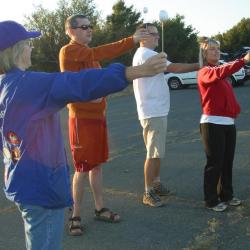Source Institutions
Source Institutions
Add to list Go to activity
Activity link broken? See if it's at the internet archive

This fun and simple hands-on astronomy activity lets learners make 3-dimensional models of the Earth and Moon. Using the Sun's light, learners will discover that the Moon rotates in the same amount of time it takes to make one orbit around the Earth. The Moon experiences day and night, but each day lasts about 14 Earth days, as does each night. The pdf contains step-by-step instructions, photos, presentation tips, and links to background information.
- 5 to 10 minutes
- 10 to 30 minutes
- $5 - $10 per group of students
- Ages 6 - adult
- Activity, Lesson/Lesson Plan, Model, Simulation
- English
Quick Guide
Materials List (per group of students)
- "moon balls" for your audience members. 1"-2" dylite balls work well.
- toothpicks
- an earth globe four times the diameter of the "moon balls"
- sticky note (optional)
Subjects
-
Earth and Space Science
- Astronomy
-
Earth, Moon and Sun
- Days
- Eclipses
-
Solar System
- The Sun
- The Moon
Informal Categories
- Arts and Crafts
- Outdoor Activity
- Model Building
Audience
To use this activity, learners need to:
- see
- be mobile
- touch
Learning styles supported:
- Involves hands-on or lab activities
Other
Components that are part of this resource:
This resource is part of:
Access Rights:
- Free access
By:
Rights:
- All rights reserved, Astronomical Society of the Pacific, 2008
